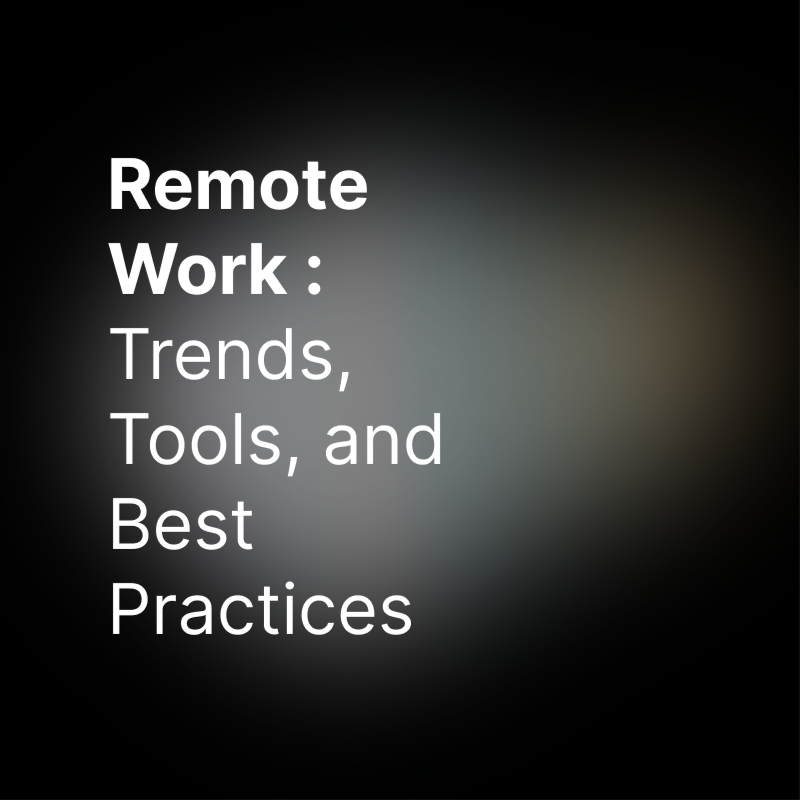The ongoing debate of whether remote work is here to stay. The pros and cons of working from home and how the economy has changed to



TL;DR Remote work has evolved from a trend to a permanent fixture, offering benefits like flexibility and autonomy. Discover AI tools like Polly AI, Shadow, and Scheduler AI, enabling remote teams to collaborate efficiently and tackle challenges while maintaining a sense of community.

In recent years, remote work has become more than just a trend; it's a fundamental shift in how businesses operate and how employees engage with their work. With the rise of technology and the necessity imposed by the pandemic, remote work counts for around 14% of the jobs in the United States. (I know it’s been quite a while but) As we navigate through the post-pandemic economy, one question looms large: is remote work ‘still’ here to stay?
For employees and companies already embracing remote work, the benefits are abundant to say the least. One of the most significant advantages is the ability to conduct meetings online, freeing participants of geographical restraints. Technologies such as video conferencing give us the option to engage in live video feeds and speak to one another in real time. However, it's essential to note that this shift doesn't come without its challenges. Employees may feel an increase in the frequency and duration of meetings, leading to a sense of prolonged discussion as a result of less face-to-face interaction.
Nevertheless, the post-pandemic era that we are now in has forced us to reconsider the role of remote work. It's not merely a temporary solution but an essential component for maintaining competitiveness in the modern business landscape. Embracing remote work allows companies to tap into a larger pool of talent. In fact, new hires consider working in the office a disadvantage and prefer remote or hybrid opportunities. The Wallstreet Journal went as far as to call it the new signing bonus. Remote work also eliminates the need for costly office contracts, providing a solution to a lot of environmental and financial concerns. As a whole remote work fosters a more efficient, distraction-free work environment for both the company and their employees.
Yet, the disconnect in opinions of employees and CEOs regarding remote work highlights a significant gap in perception. While employees may prioritize the freedom and flexibility that remote work offers, CEOs may have concerns about productivity and collaboration. Bridging this gap requires open communication and a willingness to adapt to new ways of working.
When considering the pros and cons of remote work, it's clear that the benefits outweigh the drawbacks. Employees enjoy saving time and money on their commutes, working in a comfortable environment, and having flexible hours. From a company perspective, remote work eliminates office politics and distractions or the need to sign a lease. This leads to increased efficiency of their company, and money saved on rent.
Of course, remote work isn't without its challenges. Employees may struggle with the lack of change in scenery and feelings of loneliness or isolation. However, there are solutions and services available to address these issues. For example, traveling can provide a change of scenery that you need.
Speaking of services, there's a plethora of AI tools available that can help with productivity.
Polly AI is an engagement app that was built for communication platforms like Slack. You can facilitate team bonding through daily surveys. Polly is designed to foster a sense of connection among remote team members and promote overall team engagement.

Shadow is an AI meeting assistant that helps you perform various follow-up tasks. Shadow not only transcribes and summarizes, but also extracts action items based on key insights discussed during the conversation. By understanding the conversations that are taking place, Shadow automates things like reminders, emails, and deadlines. Shadow is compatible with any communication software from Google Meets to Slack huddle, as well as offline use. Shadow comes in a bot free form factor, meaning that it doesn’t join in on calls or interrupt others with a notification.

Scheduler AI is a web based app that alleviates scheduling conflicts by managing calendars for team meetings. It’s great for managers that want to schedule 1-on-1s or group meetings, and quickly book demos and discovery calls.

These tools empower remote teams to collaborate effectively and stay organized which is something we need to keep track of when working at home. Remote work is not just a passing trend anymore but a permanent fixture. There’s even a filter for remote work on Linked In and job sites dedicated to remote positions, with new hires specifically flocking towards remote positions. Companies are now required to embrace remote work culture in order unlock new opportunities. It’s very rare that you see a tech company with employees going into the office five days a week. Remote work comes with a new trend : employees who enjoy greater flexibility and autonomy in their work lives, enhancing overall productivity.
